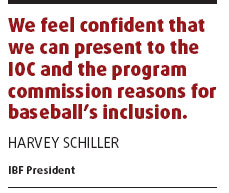WASHINGTON: World Baseball Classic winner Japan, defending Olympic champion Cuba and a talented US squad lead the chase for baseball gold at Beijing in what looks to be the sport's Olympic farewell.
International Olympic Committee officials have dropped baseball from the Games starting at London in 2012. International Baseball Federation (IBF) president Harvey Schiller swings for a last-out comeback, but a strikeout is more likely.
"We are working very hard to return the game to the program in 2016 - even in London if we can," Schiller said. "We feel confident that we can present to the IOC and the program commission reasons for baseball's inclusion."
North America's Major League Baseball refuses to shut down for the Olympics, instead staging the Classic in 2006 with top global talent, denying the Games the same elite lineups as Olympic basketball and ice hockey enjoy.

Latin American nations that provide much of the top-level US talent are seldom seen on the Olympic stage. South Korea, Chinese Taipei, Canada, China and the Netherlands will join the three favorites at Beijing.
"Our sport has not chosen to shut down to make this possible. I think there are people trying to come up with an answer for that," said US Olympic baseball general manager and Major League Baseball vice president Bob Watson.
"If some of these smart guys can come up with a way to get these major league guys without stopping the season, we can have a chance to go forward."
That appears unlikely, so Watson will simply hope for the best in Beijing.
"The best thing we can do is put on a great show at the Olympics with great enthusiasm and go about it in a way that makes people want that in 2012 and 2016 and going forward," Watson said.
Japan figures to have a star-studded team of prospects and some veterans from what has become a growing talent pool for the US major leagues, having won the inaugural Classic over teams of major league rivals.
"They are probably going to be the team to beat," US manager Davey Johnson said. "They will have future major league players."
Cuba's three-time Olympic champions won in Athens but have lost top talent due to defections. Still, the island's elite made a point in 2006 by reaching the Classic final in their first true test against major league stars.
"Cuba is blessed with a lot of great young talent," Johnson said. "Japan has come a long way. Korea, Chinese Taipei and now China, they have the fever. With the great athletes they have it won't be long until they have great players."
A US team of collegians failed to qualify for Athens in 2004.
"There was a lot of pressure for us to bring back the US to where we belong - on top," Johnson said.
An embarassing US exit before the 2006 Classic semifinals taught Johnson that a "Dream Team" approach was doomed to fail.
"We didn't play very good as the Dream Team. You can't run those games like an all-star game," he said. "You can't afford to make a mistake in selecting the team. The level of competition is too good around the world."
US teams will be cautious about allowing top prospects, pitchers especially, in the Olympics, but talent just below the major league level still might be the best US Olympic squad ever.
Half the 24-man lineup will be pitchers, ensuring none of the prospects are taxed too much in the quest to restore US honor.
"We will guarantee them to use them correctly, to not overpitch them," Watson said.